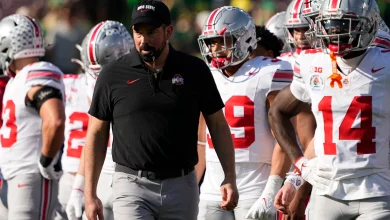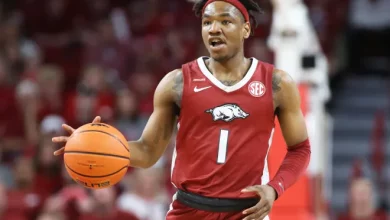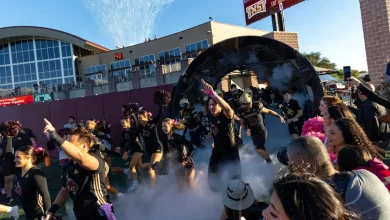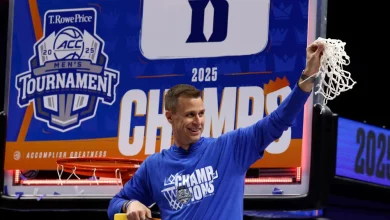Tennessee QB Nico Iamaleava could explore transfer portal or lucrative NIL deals, with top programs eager for his elite talent.
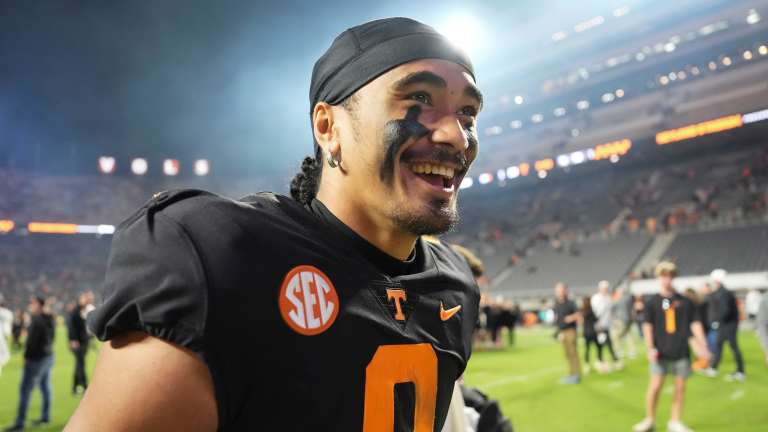
In the modern era of college football, the line between loyalty and opportunity has become increasingly blurred. With the NCAA transfer portal in full swing and Name, Image, and Likeness (NIL) deals reshaping the landscape of amateur athletics, players have more freedom and financial flexibility than ever before. Nowhere is this more evident than in the case of Tennessee quarterback Nico Iamaleava, one of the most highly touted young quarterbacks in the country.
At just 20 years old, Iamaleava stands at a pivotal crossroads in his football journey. The former five-star recruit out of California was expected to be the crown jewel of Josh Heupel’s up-tempo offense at Tennessee. With his electric arm, athleticism, and calm demeanor in the pocket, he brought hopes of a return to national prominence for the Vols. But recent developments have sparked conversations that seemed unthinkable a year ago: Could Nico Iamaleava actually leave Tennessee?
As rumors swirl regarding NIL disputes and potential dissatisfaction behind the scenes, it’s clear that Iamaleava, should he choose to explore his options, would not be short of suitors. Let’s explore why he’s become such a valuable commodity, what options he realistically has, and what it all means for Tennessee football.
Nico Iamaleava: A Star in the Making
Before diving into the “what ifs,” it’s important to understand just how significant Iamaleava is as a player. Standing 6’6″ with elite arm strength and mobility, he was ranked as the No. 2 quarterback in the 2023 recruiting class, just behind Arch Manning. Many analysts believed that Iamaleava actually had the higher ceiling, given his raw tools and style of play that seemed tailor-made for today’s college offenses.
After spending most of his freshman season learning behind veteran Joe Milton, Iamaleava finally got his shot in the Citrus Bowl—and he didn’t disappoint. He threw for over 200 yards and ran for two touchdowns, showcasing poise and playmaking ability that lit up the fanbase and national media alike. Expectations were sky-high heading into 2024, with many projecting Iamaleava as a breakout star and potential Heisman contender.
The NIL Era: A New Frontier
However, stardom in college football now comes with more than just touchdowns and trophies—it comes with dollars. The NIL revolution has fundamentally shifted the relationship between college athletes and their programs. Top players, especially quarterbacks, are no longer just students on scholarship; they are walking, talking brands.
According to multiple reports, Iamaleava’s NIL value is estimated to be well into seven figures. When he initially committed to Tennessee, it was believed he signed one of the most lucrative NIL deals for a high school prospect at the time. But as the NIL market has matured, discrepancies in promised deals, delivery timelines, and market competitiveness have become hot-button issues.
Recently, rumors emerged that Iamaleava skipped spring practice while re-evaluating his NIL situation—fueling speculation that he may be open to leaving the program. While no formal transfer request has been filed, the mere possibility has sent shockwaves across the college football world.
The Transfer Portal: A Door to Opportunity
The NCAA’s transfer portal has become the most dynamic tool in modern college football. With players no longer required to sit out a season upon transferring, immediate eligibility has created a sort of “free agency” atmosphere. For a player like Iamaleava, the portal represents an escape hatch—and a golden opportunity.
Should he enter the portal, schools across the country would line up to pitch their program, their offense, and, of course, their NIL packages. Programs in need of a game-changing quarterback would waste no time. And let’s be honest—every program is looking for their next big-time QB.
Among the potential landing spots could be:
- USC: Iamaleava is a California native, and with Caleb Williams now in the NFL, the Trojans have a glaring need at quarterback. Lincoln Riley’s offense would be a seamless fit for Iamaleava’s skill set.
- Oregon: Another West Coast powerhouse, Oregon has been aggressive in both the transfer portal and NIL space.
- Miami: A sleeping giant in need of a quarterback to reenergize the program—and with a growing NIL war chest.
- Alabama or Georgia: The SEC remains the premier conference, and both programs could pitch title contention right away.
Why He Might Stay
Despite the buzz, there are also strong reasons for Iamaleava to remain at Tennessee. He has already invested valuable time learning Heupel’s complex offensive system. He has built rapport with teammates, coaches, and the Knoxville community. There’s something to be said for continuity—especially for quarterbacks.
Moreover, Heupel’s offense is built to maximize quarterback play. Hendon Hooker’s rise to Heisman finalist status in 2022 is proof of what’s possible in this system. If Iamaleava stays and plays a full season, he could very well become a top NFL Draft prospect. That kind of visibility and development isn’t guaranteed at another school, no matter how big the brand.
There’s also the possibility that the NIL concerns can be resolved. In many cases, public pressure or donor involvement can smooth out issues quickly. The Volunteer fan base is rabid, passionate, and extremely invested in retaining their star. It wouldn’t be surprising to see boosters step up to ensure Iamaleava is compensated fairly.
The Bigger Picture for Tennessee
The idea of losing a quarterback of Iamaleava’s caliber is more than just a football concern for Tennessee—it’s a cultural and recruiting issue. If top recruits perceive instability or NIL dysfunction, it could affect the Vols’ ability to attract elite talent in future classes.
It also calls into question how programs handle NIL promises and partnerships. As more top players become vocal about their value, schools will be forced to either adapt quickly or risk losing their biggest assets. Coaches, administrators, and donors must work in sync to avoid the pitfalls of broken expectations.
Losing Iamaleava would not only set Tennessee back on the field—it could represent a setback in the Vols’ broader ambitions to rejoin the SEC elite alongside Georgia and Alabama.
What Happens Next?
Right now, everything hinges on what Iamaleava wants. If his priority is maximizing NIL value in the short term, the market is wide open. If it’s about long-term development and winning, Tennessee still presents a very strong case.
Sources close to the program suggest that discussions are ongoing and that both sides are hopeful for a resolution. But in the NIL era, hope is often not enough. Concrete action is needed—whether that means restructuring deals, reaffirming commitments, or preparing for the worst-case scenario.
If Iamaleava stays, he has the potential to become the face of Tennessee football, a future first-round NFL Draft pick, and a campus legend. If he leaves, he becomes the latest in a growing line of stars leveraging the system to find the best opportunity—on their terms.



